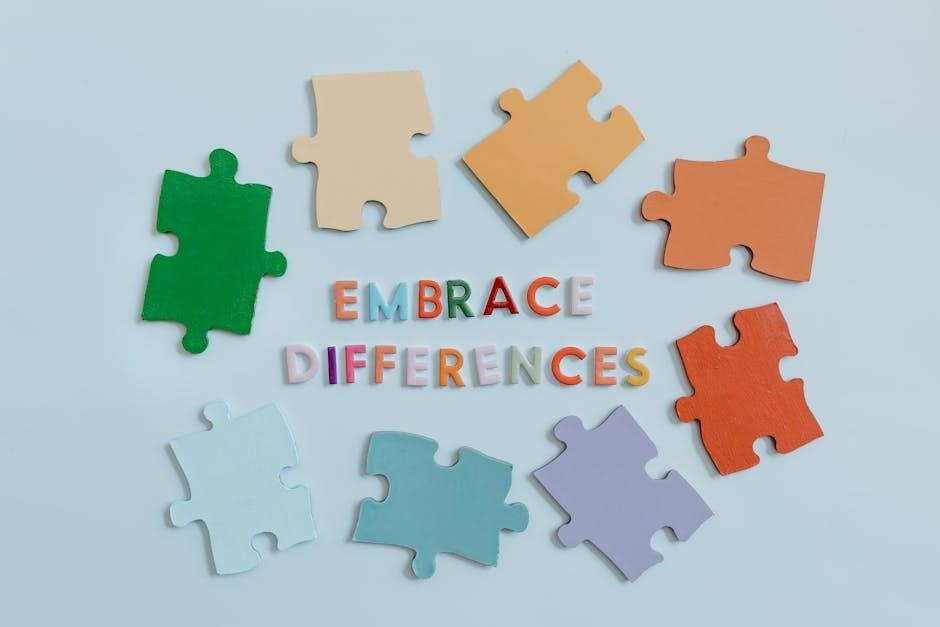Radical Acceptance, popularized by Tara Brach, is a transformative approach to embracing life’s challenges with compassion and mindfulness. It combines Buddhist teachings with modern psychological insights to foster inner peace and self-acceptance, offering practical tools for emotional healing and spiritual growth through guided meditations and reflective practices.
1.1 Definition and Core Concepts
Radical Acceptance, as defined by Tara Brach, is the practice of embracing life fully, including its challenges, with compassion and mindfulness. Rooted in Buddhist teachings, it involves acknowledging and accepting difficult emotions or situations without judgment. Core concepts include recognizing our inherent worth, cultivating self-compassion, and understanding that true freedom arises from accepting life as it is, rather than resisting or avoiding it.
1.2 The Role of Tara Brach in Popularizing Radical Acceptance

Tara Brach, a clinical psychologist and mindfulness teacher, has been instrumental in bringing Radical Acceptance to a wide audience. Through her books, lectures, and guided meditations, she integrates Buddhist principles with modern psychology, making the concept accessible and practical. Her work emphasizes compassion and self-awareness, helping individuals heal emotional wounds and live authentically, thus establishing her as a leading voice in the field of mindfulness.

Tara Brach’s Background and Contributions
Tara Brach, a clinical psychologist and renowned mindfulness teacher, combines Buddhist principles with Western psychology to foster emotional healing and self-acceptance. Her books, including Radical Acceptance and True Refuge, have become influential resources for mental health and personal growth, earning her international recognition as a leader in the field of meditation and spiritual awakening.
2.1 Tara Brach’s Education and Profession
Tara Brach holds a Ph.D. in clinical psychology and is a renowned mindfulness meditation teacher. She combines Buddhist principles with Western psychology, offering a unique approach to emotional healing. Brach has authored several influential books, including Radical Acceptance and True Refuge, and hosts a popular podcast focused on mindfulness and self-compassion, reaching a global audience seeking personal growth and inner peace.
2.2 Her Work in Mindfulness and Psychology
Tara Brach’s work seamlessly integrates mindfulness meditation with psychological practices, offering tools for emotional healing and self-discovery. She emphasizes radical acceptance as a path to inner freedom, addressing issues like self-criticism and trauma. Her teachings, shared through books, podcasts, and retreats, empower individuals to cultivate compassion and mindful presence, fostering resilience and profound transformation in daily life and relationships.

Key Themes in “Radical Acceptance”
Radical Acceptance explores embracing life with a Buddha-like heart, emphasizing self-compassion and mindfulness. It introduces a four-step meditation to heal emotional pain, fostering freedom and joy.
3.1 Embracing Life with the Heart of a Buddha
Tara Brach’s teachings emphasize living with the heart of a Buddha, fostering compassion and mindfulness. This approach encourages embracing life’s challenges without judgment, aligning with Buddhist principles to cultivate inner peace and self-acceptance. By integrating these practices, individuals can transform suffering into growth, leading to a deeper sense of freedom and connection to their true nature.
3.2 The Four-Step Meditation for Emotional Healing
Tara Brach’s four-step meditation offers a powerful path to emotional healing. It begins with recognizing difficult emotions, then allowing them without judgment. Next, investigating their roots fosters understanding. Finally, nurturing oneself with compassion transforms suffering into healing. This practice, detailed in her teachings, helps cultivate mindfulness and resilience, guiding individuals toward inner peace and emotional freedom.

Guided Meditations and Practices
Tara Brach’s guided meditations offer transformative practices for emotional healing and inner peace. These mindfulness exercises, detailed in her PDF resources, foster compassionate presence and resilience.
4.1 Overview of Radical Acceptance Guided Meditations
Tara Brach’s guided meditations, outlined in her Radical Acceptance PDF, offer a pathway to emotional healing through mindfulness and compassion. These practices, rooted in Buddhist teachings, guide individuals in cultivating acceptance of life’s challenges. The meditations include a four-step process for transforming difficult emotions and fostering inner peace. Designed to be accessible, they empower practitioners to embrace their experiences with clarity and kindness, leading to profound personal transformation and resilience.
4.2 Practical Applications of Mindfulness Practices
Mindfulness practices from Tara Brach’s Radical Acceptance PDF offer tools for daily life, helping individuals manage emotions and reactions. Techniques like the four-step meditation foster self-awareness and compassion. These practices encourage presence in the moment, reducing stress and enhancing emotional resilience. Brach’s guidance supports applying mindfulness in real-life scenarios, promoting emotional healing and a deeper connection to one’s experiences and well-being.

Radical Acceptance PDF and Digital Resources
- Content: The Radical Acceptance PDF by Tara Brach includes guided meditations, practical tools, and insights for emotional healing and mindfulness practices.
- Availability: The PDF is accessible online, offering a comprehensive guide to cultivating self-compassion and embracing life fully through Brach’s transformative teachings.
5.1 Availability and Content of the PDF
The Radical Acceptance PDF by Tara Brach is widely available for download online, offering a comprehensive guide to her teachings. It includes guided meditations, practical tools, and insights for emotional healing. The PDF outlines Brach’s approach to mindfulness and self-compassion, drawing from her decades of experience in psychology and Buddhist practices. It serves as a valuable resource for those seeking to cultivate radical acceptance and live more fully.
5.2 Benefits of Using Guided Meditation Resources
Guided meditation resources from Tara Brach offer profound benefits, including emotional healing and spiritual growth. These tools help cultivate mindfulness, compassion, and self-acceptance, providing practical steps to manage difficult emotions. By following Brach’s meditations, individuals can develop greater resilience, reduce self-criticism, and deepen their connection to their inner selves. These resources are accessible and easy to integrate into daily life, fostering lasting transformation and well-being.

The Concept of Buddha Nature
Buddha Nature refers to the inherent potential for happiness and freedom within everyone, emphasizing radical acceptance as a path to awakening this inner truth and living fully.
6.1 Understanding Buddha Nature in Radical Acceptance
Buddha Nature, as explored in Tara Brach’s teachings, signifies the innate capacity for awakening and joy within every individual. Radical acceptance aligns with this concept by encouraging a profound embrace of life’s circumstances, allowing individuals to recognize and embody their true nature. This understanding fosters compassion, freedom, and the realization of one’s intrinsic worth, leading to a life of authenticity and fulfillment.
6.2 Cultivating Fundamental Happiness and Freedom
Radical acceptance, as taught by Tara Brach, reveals that fundamental happiness and freedom arise from embracing life as it is. By letting go of resistance and judgment, individuals can align with their true nature, fostering a deep sense of liberation and joy. This practice encourages living authentically, untethered by emotional burdens, and approaching life with openness, compassion, and curiosity.

Real-Life Applications of Radical Acceptance
Radical acceptance helps individuals embrace life’s challenges with compassion, transforming emotional struggles into opportunities for growth and healing. Tara Brach’s teachings provide practical tools for fostering inner peace and resilience in daily life, empowering people to navigate difficulties with mindfulness and self-compassion, leading to profound personal transformation and emotional well-being.
7.1 Overcoming Emotional Deficiency and Self-Criticism
Tara Brach’s radical acceptance teachings offer powerful tools to address emotional deficiency and self-criticism. By cultivating mindfulness and compassion, individuals can reframe negative self-perceptions, embracing their true worth; Brach’s guided mediations and four-step process provide practical pathways to heal emotional wounds, fostering self-compassion and inner peace. This approach helps transform self-criticism into understanding, allowing individuals to live more authentically and wholeheartedly, free from the burden of self-doubt and deficiency.
7.2 Healing Psychological Trauma Through Acceptance
Radical acceptance offers a profound pathway to healing psychological trauma by fostering compassion and mindful presence. Tara Brach’s teachings emphasize transforming suffering into opportunities for growth, encouraging individuals to approach trauma with kindness rather than resistance. Through guided meditations and self-compassion practices, radical acceptance creates a safe space for healing, allowing individuals to reclaim their wholeness and find peace amidst past wounds, promoting emotional resilience and spiritual awakening.

The Role of Compassion in Radical Acceptance
Compassion is central to radical acceptance, as it transforms suffering into healing. Tara Brach teaches that compassion, both for oneself and others, fosters mindful presence and emotional resilience, guiding us toward inner peace and understanding.
8.1 Developing Compassion for Yourself and Others
Compassion is central to radical acceptance, as it transforms suffering into healing. Tara Brach teaches that cultivating compassion for oneself and others fosters emotional resilience and understanding. By practicing mindfulness and meditation, individuals can develop a deeper sense of kindness and empathy, healing emotional wounds and building stronger connections with others. This approach encourages self-acceptance and extends loving-kindness to all beings, promoting inner peace and harmony.
8.2 Mindful Presence as a Tool for Emotional Healing
Mindful presence is a powerful tool for emotional healing, as it allows individuals to engage fully with the present moment without judgment. Tara Brach emphasizes that this practice creates space between emotional reactivity and response, fostering resilience and understanding. By cultivating mindful presence, one can transform suffering into opportunities for growth, healing, and deeper connection with oneself and others, as outlined in her teachings and guided meditations.
Radical Acceptance offers a transformative path to freedom, helping individuals embrace life fully. Tara Brach’s teachings provide practical guidance for emotional healing and discovering inner peace.
9.1 The Transformative Power of Radical Acceptance
Radical Acceptance transforms lives by teaching individuals to embrace their true selves and life’s challenges with compassion. Tara Brach’s approach combines mindfulness and Buddhist wisdom, offering tools like her four-step meditation to heal emotional pain. By fostering self-compassion and mindful presence, Radical Acceptance empowers people to break free from suffering and awaken to their inherent Buddha nature, unlocking lasting happiness and freedom.
9.2 Living Fully Through Radical Acceptance
Radical Acceptance empowers individuals to live fully by embracing life’s precious moments with openness and kindness. By letting go of self-judgment and resistance, people can break free from emotional barriers and cultivate a deep sense of fulfillment. This approach, rooted in mindfulness and compassion, encourages living in alignment with one’s true nature, leading to a joyful and authentic existence.



